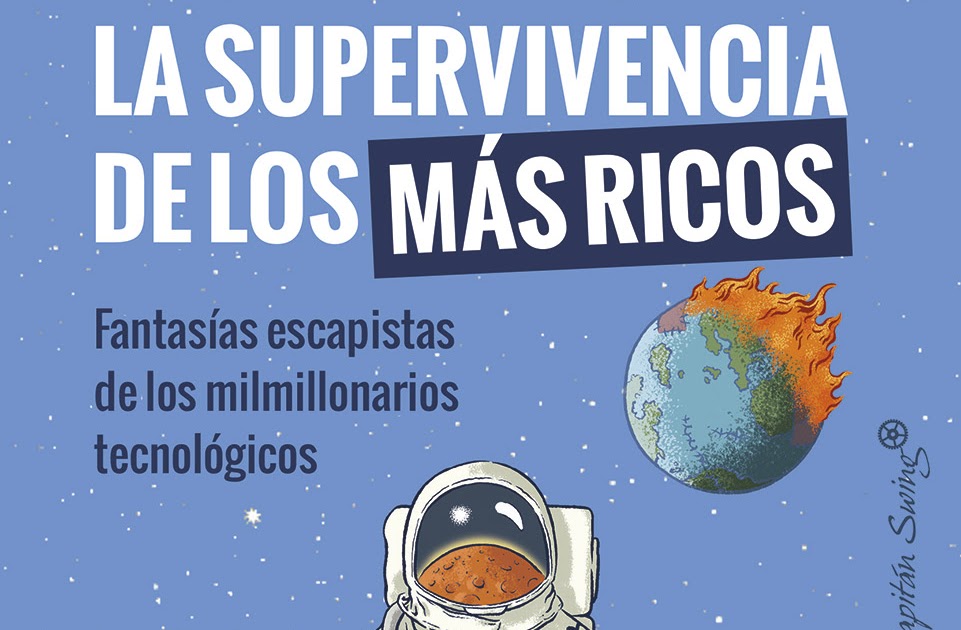
We live at the mercy of the coming and going of the illusions of a few thinking minds that are in charge day after day of defining, planning and creating the world in which they want to live. They have done it until now and they will continue to do it, but there will be a time when they will no longer want to live in this world, nor in their wealthy plots of land where they live isolated from the rest of the population, from humanity. Elon Musk knows it and so does the author of this very interesting essay, Douglas Rushkoff, someone who defines himself as a “humanist who writes about the impact of digital technology on our lives” (…) and who states that “I have never really liked talking of the future, and even less so for the rich”, who is in charge of dissecting this reality and alerting us to what awaits us if we continue to contribute (actively, but especially passively) to what they have in store for us.
This brilliant and overwhelming analysis, profound but very enjoyable to read, begins with an introduction where the author describes how he was hired to give a private talk to “five super-rich guys—yes, all men—from the upper echelons of the world of technological investment.” and hedge funds. At least two of them were billionaires” and that “there they were, asking a Marxist-leaning media theorist for advice about where and how to set up their post-apocalyptic bunkers.” In that talk the author quickly discovered that humanity as a whole was not part of their plans, because “for them, the future of technology consists of one thing: escaping from the rest of us” and, therefore, they sought to find “a means to escape the apocalypse that they themselves have created.
With this premise, Douglas Rushkoff, considered one of the ten most influential intellectuals in the world according to MIT, writes this essay to tell us the plans that technological billionaires have for our (and especially “their”) future and, like every essay that is price, this analysis cannot start in media res, but the author casts his sharp gaze into the past to see the evolution (sic) that we have experienced and locates its origin in the Declaration of Independence of Cyberspace, a declaration in which it was intended to prevent “governments from exercising their authority over this new collective project of humanity” but that the author confesses that our hope was based merely on an illusion because “most of us overlooked the line that closed the manifesto: “Davos, Switzerland, February 8, 1996” ; the time and place of the famous World Economic Forum, ground zero of global capitalism. It was evident that a declaration agreed upon and signed at the peak of capitalism could not bring anything good to humanity as a whole.
The American author is very critical of technological platforms because, in reality, the famous mantra that, being an apparently free service, we are the product has been surpassed. Rushkoff goes further and affirms that we have already transgressed that point, because “in this type of platforms we are not so much the product as the workforce. We read, click, publish and retweet diligently (…) all of that is work. All this relationship that we establish with the platforms has modified our vision of the world, we have removed them from their obvious layers of responsibility until we reach the point that “we have decided that capitalism implies being affectionate and empathetic with companies, and rigorous and Darwinian with individuals”, something that became evident in a very obvious and alarming way with the COVID pandemic that made us more flexible with the abuses committed by large companies and with whom we ended up collaborating in their rise and expansion. Thus, the pandemic isolated us, not only physically but also emotionally and humanitarianally, since we stopped interacting with those who are outside our bubbles and that is a problem because “we usually establish relationships with other people through subtle social signals that have evolved over time.” centuries to promote emotional ties and group sharing. A pandemic that made us buy objects and food that were brought to us by delivery people exposed to viruses in their workplaces and shared transportation while we received them in the comfort of our home with our eyes closed so as not to see that the distance between them and us was not It was measured in centimeters but in bills.
And, despite the benefits that technological progress can bring us on a daily basis, it is also true that, as the author states, “the best that technology can really offer us is a false illusion of isolation: regardless of What happens to others—be it a specific virus or a system-wide climate catastrophe—can make us feel protected (…) no matter how immersed we are in the online game of life, the real world, the of viruses, poverty, terrorism, climate change and other horrors, persists. “It’s just that we are less able to empathize with him.” A climate change that invades us and of which we pretend to believe that we are oblivious to its consequences while we increase its effect with the illusion that there will always be a possibility of stopping it. Because in the mentality of those who govern the system, the solution has always been to move forward, sweeping everything away, leaving corpses along the way that lie quickly forgotten buried under the rubble left by progress, because “the rhetoric of Silicon Valley (… ) always exhibits the same distinctive features as those business plans: progress, future, optimism, transformation, profit. But usually these are just euphemisms to refer to conquest, colonization, domination, extraction. And in this flight always forward, it is easy to deduce that “each of us is becoming more valuable as a set of data than as consumers of flesh and blood, or even as human beings” because “possibly the most tragic defect of the triumphalists “technological means is their absolute contempt for history.”
Rushkoff states that “the most aggressive conquerors and capitalists in the world (…) move quickly when breaking things so that, when they fall, the rubble they leave behind does not reach them” although unfortunately the rubble does not disappear, we just stop seeing it at once. fix our gaze towards a stellar horizon full of progress and new technologies that, once again, they believe can save us because “like a small child who wants to hide and believes that by covering his eyes with his hands he can prevent those who try to see him.” depending on digital technology to mediate with the world of media is going to be in for a good surprise” and goes into depth by quoting John Culkin (one of the fathers of media theory) stating that “we become what we contemplate. We shape our tools and then our tools shape us. We have reached this point, we have become the product of its products, now the question is to discover if we will be able to overcome a world that, always taking us forward, directs us directly to an abyss from which there is no technological exit but a humanistic one because , after all, “since when are humans here to serve the economy?”
Source: https://unlibroaldia.blogspot.com/2023/11/douglas-rushkoff-la-supervivencia-de.html


